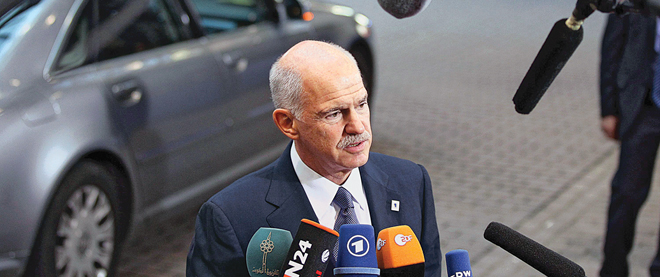Papandreou’s referendum bombshell
EU leaders hammered out an emergency fiscal deal—but then came the Greek PM’s announcement
Oliver Berg/EPA/Keystone Press
Share

European markets again plunged this week after a surprise announcement on Monday by Greek Prime Minister George Papandreou that he would hold a referendum on the latest EU debt deal. The “comprehensive financial package” settled upon last Thursday in Brussels, after several days of agonizing negotiations between eurozone leaders, is the latest in a series of rescue plans intended to save the euro in the face of the deepening sovereign debt crisis. Its chief aim is the prevention of an uncontrolled Greek default, a situation many see as the economic death knell for a united Europe. To this end, eurozone leaders convinced private holders of Greek debt to agree to a 50 per cent loss, intended to shrink that debt down to a sustainable level. European banks will have to recapitalize to the tune of 106 billion euros in order to help them absorb the Greek losses with minimal fallout.
Though Papandreou eventually backed away from the idea of putting the bailout package to a vote, his announcement stunned European capitals and threw the future of the already shaky plan into even deeper doubt. While he did not set a date, response to the statement was immediate. In addition to the European nosedive, Wall Street and Asian markets took fright, and the Athens stock exchange plunged nearly seven per cent on opening Tuesday. Why would an embattled leader expose his faltering economy to even further danger, let alone risk being forever branded as The Man Who Toppled Europe? Simply because it may be the only way he can hold on to power.
The move is politically expedient because it will allow Papandreou’s socialist party, under increasingly hostile and volatile public criticism in recent months, to pass the buck on the nation’s future to the Greek people themselves. Either way, the choice isn’t easy: Greeks are facing more of the unpopular austerity measures they have been demonstrating against for months—or complete default. “The citizen will be called upon to say a big ‘yes’ or a big ‘no’ to the new loan arrangement,” Papandreou told parliament. “This is a supreme act of democracy and of patriotism. We have a duty to promote the role and the responsibility of the citizen.”
While eurozone policy makers howled in despair at the notion of one leader potentially bringing down the entire EU dream like a house of cards, euroskeptics on the right applauded Papandreou’s decision. The Daily Telegraph’s Jeremy Warner declared the notion of a Greek “no” vote “a blessing in disguise,” one which would prove “a cataclysmic economic event, but very probably better than the death by a thousand cuts that awaits if Greece agrees to the bailout.” If Greece votes against Papandreou, there is a possibility his government will fall and the country will default and descend into chaos. This turn of events, Warner argues, would ultimately be a good thing, as “whoever stepped into the ensuing vacuum would have to impose capital controls and leave the euro.”
The dark irony of the sovereign debt crisis, of course, is that it is precisely the great dream of European unity—an open trading zone, a single currency and one central bank—that has created a cultural divide and political fractiousness not seen on the Continent since the end of the Second World War. The deal is the third so-called “solution” to be cobbled together in the past year. And while it is unlikely to solve all of Europe’s problems, if passed, it could signal significant progress in the eurozone’s effort to prevent disaster.
The package consists of a linked three-pronged plan that some commentators believe relies too heavily on the same kind of financial sleights of hand that brought on the world financial crisis in the first place. In addition to the Greek bailout, there is the much-vaunted one-trillion-euro “firewall” intended to prevent the threat of a contagion effect spreading to the eurozone’s solvent yet at-risk economies such as Italy and Spain. Known as the European Financial Stability Facility (EFSF), this is the jar of mad money meant to stave off the threat of a complete collapse. But where’s the extra dosh coming from? It’s a good question—and not an easy one to answer.
Last month, the eurozone talks seemed to be on the brink of collapse when Germany shot down the France-led proposal that the EFSF should be able to borrow from the European Central Bank (an institution backed largely by Germany, the biggest and strongest economy in the zone). Germany’s stubborn refusal to take on the extra risk (driven largely by lack of political support from its voters) means that the EFSF will need to be stretched by other means—specifically, a complicated form of “credit enhancement” combined with schemes to attract rich foreign investors, namely China and Brazil.
Many believe it is up to Merkel to pony up, but in a recent parliamentary vote, the German coalition refused to increase its guarantee on the EFSF (which was raised to 211 billion Euros in September) or accept the creation of collectively underwritten Eurobonds. German politicians are still committed to the idea of European unity—they voted overwhelmingly in support of strengthening the bailout fund—but they don’t want the added risk that comes with it.
But even if the new emergency fund were to fall into place—an increasingly big “if”—the eurozone couldn’t afford to bail out Italy or Spain. The plan, which was being hailed by eurozone leaders as the Continent’s best hope, seems precarious at best, with opposition politicians asking for Papandreou’s resignation and early elections in exchange for their support of the deal. It’s either democracy in action or a disaster in the making. In truth, it’s probably both.